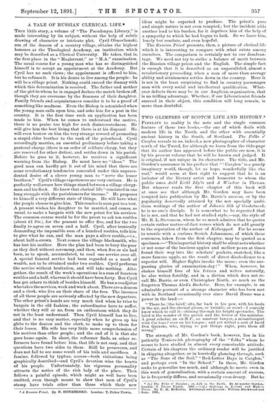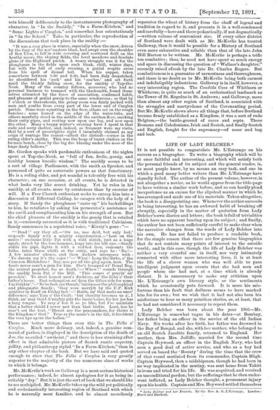TWO GLIMPSES OF SCOTCH LIFE AND HISTORY.*
FIDELITY to reality is the note and the single common feature of these two books,—the one of which deals with modern life in the North, and the other with essentially
ancient history in the South, of Scotland. The Folks o' Carglen reveals to us, indeed, a new photographer of character north of the Tweed, for although we learn from the title-page that its author has appeared before the public ere now, it is by his present volume that be will be known and judged. It is original, if not unique in its character. The title, and Mr. Gordon's assurance in his preface that "' Carglen' is a purely imaginary world, though, let us hope, wonderfully like the real," would seem at first sight to suggest that he is an imitator of the literary artist and humorist to whom the public owes Auld Licht Idylls and A Window in Thrums. But whoever reads the first chapter of this book will at once see that although Mr. Gordon may have been tempted into publication by Mr. Barrie's success, or by the popularity deservedly attained by the not specially ambi- tious writings of the author of Johnnie Gib of Gushetneuk, he is no one's disciple. It is somewhat to be regretted that he is not, and that he had not studied style,—say, the style of Mr. R. L. Stevenson, whom he so much admires that he quotes certain rather matter-of-fact verses which do not add greatly to the reputation of the author of Kidnapped. For he seems to wrestle with a carious Scotch Johnsonese, of which these sentences, taken from the first chapter, may be quoted as a specimen :—" This impartial history shall be silent as to whether or not some of the luscious apples and mellow pears at times found their way into the scholars' pockets, snatched, like a more famous apple, as the result of direct disobedience to a superior will. Higher flights invoke the muse ; even the sur- passing glories of examination-day !" When, however, he shakes himself free of his fetters and writes naturally, he also writes forcibly, and in a diction which does not re- call Mr. Barrie, or even Christopher North, so much as the forgotten Thomas Aird's Bachelor. Here, for example, is an admirable portrait of a strange character wbo has been met with in Scotland occasionally ever since David Hume was a power in the land :—
" There he [the laird] sits, far back in his pew, with his heels in the air, and the eternal gleam, or twinkle, or scowl—I scarcely know which to call it—shining through his bright spectacles. The laird is the wonder of the parish and the terror of the minister. A great scholar, an ex-M.P., an amateur lawyer, a misanthropist with Cui bona ? ever on his tongue ; and yet withal a sort of lucid Don Quixote, who, trying to put things right, puts them all wrong."
The strength of Mr. Gordon's book, however, lies in his patiently Teniers-ish photography of the " folks " whom he seems to have studied in almost every conceivable attitude. Certain of his chapters the ordinary reader will be justified in skipping altogether, or in hurriedly glancing through, such as " The Sons of the Soil," " Red-Letter Days in Carglen," and perhaps even " In the School." In these, Mr. Gordon seeks to generalise too much, and although he meets even in this work of generalisation, with a certain amount of success, he is frequently diffuse, and occasionally even dreary. But he
• (1.) The Folks o' Carglen ; or, Life in the North. By Alexander Gordon. London: T. Fisher Unwin. 1891.-12.) Galloway in Ancient and Modern Times. By P. 11. McKerlie. Edinburgh and London : William Blackwood and Bons. 1891.
sets himself deliberately to the instantaneous photography of character, in "In the Smiddy," "In a Farm-Kitchen," and " Some Lights o' Carglen," and somewhat less ostentatiously in "In the School." Take, in particular, the reproduction of the discussions that took place in the smithy :—
"It was a cosy place in winter, especially when the snow, driven by the fury of the nor'-eastern blast, had swept over the shoulder of. Ben 171en, to fall'in wide covering and scattered drift on the heathy moors, the sloping fields, the level meadows and desolate glens of the Highland parish. A weary struggle was it for the ploughman in the fields upon such bleak, chill, winter days, but with the fall of early evening, a genial respite arose from his spell of dismal toil. When his supper, taken somewhere between 5.30 and 6.30, had been duly despatched, he shouldered his 'sock and his couter,' and set forth amid the thickly falling snow, for the smiddy o' Tap-the- Neuk. Many of the country fellows, moreover, who had no personal business to transact with the blacksmith, found them- selves, attracted by the force of association, confirmed habit, and pleasure of genial gossip to the same rendezvous ; so that by 7 o'clock or thereabouts, the grimy room was fairly packed with men and youths from every part of the lower end of Carglen parish. Some were squatting on the floor, others sat on the rough benches • some leaned on the edge of the water-tubs, and others manfully stood in the middle of the earthen floor, smoking their cutty pipes, and resting now upon one leg, and now upon the other. Many a happy winter's evening have I spent in that rude and sooty shelter, and, indeed, so frequent were my visits, that by a sort of prescriptive right I invariably claimed as my coign of vantage the cosiest—albeit the dirtiegt—corner in 'the ruling elder's smithy. This was the heap of burnt cinders on the furnace bench, close by the big fire blazing under the nose of the huge dusty bellows."
Mr. Gordon speaks with pardonable enthusiasm of the nights spent at Tap-the-Neuk, as "full of fun, frolic, gossip, and healthy human bucolic wisdom." The smiddy seems to be a sort of village Parliament, with the smith as Speaker, and possessed of quite as autocratic powers as that functionary. He is a ruling elder, and yet scandal is tolerably free with his character ; on one occasion, at all events, he is detected in what looks very like secret drinking. Yet he rules in his smiddy, at all events, more by astuteness than by exercise of will. If a Free Church enthusiast seeks to entrap him into a discussion of Effectual Calling, he escapes with the help of a story. If Sandy the ploughman "casts up" his backslidings to him, he retaliates by asking his persecutor's assistance at the anvil, and complimenting him on his strength of arm. But the chief pleasure of the smiddy is the gossip that is retailed in it,—curiously saturated as it is with traditional Calvinism. Sandy announces in a sepulchral voice, Kirsty's gone : "-
"' Dead ! ' cry they all. = Ow na, nae deid, but only lost,' responds Sandy with a mighty expectoration.—' Lost on the muirs !' exclaims little Pat with a wild shriek, just as a huge spark, struck by the fore-hammer, leaps into his left eye.—Sandy refills his pipe, lights it with a red-hot iron; remounts the lathe, takes three whiffs at the cutty, and says he : Na.'— A few minutes' silence, and then Andrew interposes with : Ye darena say it's the sojer '—' What ! Loup-the-Dyke, o' the Cameron Hielanders P Nay, noo yer aff the gleg again, man. The lassie never care't a prin for him. She's tramped wi' Donal Beg, the revival preycher, fac as death.'—' Whew ! sounds through the smiddy from Pat o' the Mill. This comes o' prayin' an' preachin'. To steal honest men's dochters, an' the licht o' their father's hoose. Past redemption an' doon the tither side for some, I'm thinkin'.'—' Ne'er fash yer thumb,' interposes the philosophical and phlegmatic Sandy ; 'they were merryit by the C.F. Kirk minister in Banff on Friday last.'—' Haith, an' that maks an unto' difference,' says Tam o' the Croft; 'but cheritty becomes us a', I think, an' may Guid A'mighty pity the lassie's ears, for her joe has a lang tongue. Ye may a' hae it as ye like, but I'se maintain that a better chield I never met than that birkie. Lord, hoo he roar't oot the text, " Blessit are the peacemakers, for theirs is the Kingdom o God." True as the mune's in the lift, it frechtent the vera kye ayont the hallan.' " There are better things than even this in The Folks o' Car glen. Much more delicacy, and, indeed, a genuine com- mand of pathos, is displayed in the description of the death of Joe, the so-called " awtheist ;" and there is less straining after effect in that admirable picture of Scotch rustic coquetry, jollity, and philanthropy styled "In a Farm-Kitchen," than in any other chapter of the book. But we have said and quoted enough to show that The Folks o' Carglen is very greatly superior to the majority of the too numerous class of works
to which it belongs. • Mr. McKerlie's work on Galloway is a most serious historical performance ; indeed, he almost apologises for it as being in- evitably "dry." But it is just the sort of book that we should like to see multiplied. Mr. McKerlie takes up the wild yet politically and ecclesiastically interesting region of Scotland with which
he is naturally most familiar, and he almost mercilessly Must and Blaokett. separates the wheat of history from the chaff of legend and tradition in regard to it, and presents it in a well-condensed and carefully—here and there pedantically, if not dogmatically —written volume of convenient size. If every other district of Scotland were. dealt with as Mr. McKerlie has treated Galloway, then it would be possible for a History of Scotland_ even more exhaustive and reliable than that of the late John Hill Burton to be written. Mr. McKerlie is perhaps a trifle too combative ; thus, he need not have spent so much energy and space in discussing the question of " Wallace's daughter," recently raised afresh by the late Dr. Charles Rogers. But combativeness is a guarantee of earnestness and thoroughness,. and there is no doubt as to Mr. McKerlie being both earnest and indefatigably industrious. Galloway is in itself, however, a very interesting region. The Candida Casa of Whithorn or Whitherne, is quite as ranch of an ecclesiastical landmark as the Tower of St. Regulus in St. Andrews; and Galloway, more than almost any other region of Scotland, is associated with the struggles and martyrdoms of the Covenanting period. But Mr. McKerlie shows above all things that, before Scotland became firmly established as a Kingdom, it was a sort of rude- Belgium,—the battle-ground of races and septa. There Romans and Caledonians, Irish and Scotch, and finally Scotch and English, fought for the supremacy—of moor and bog and loch.



































 Previous page
Previous page